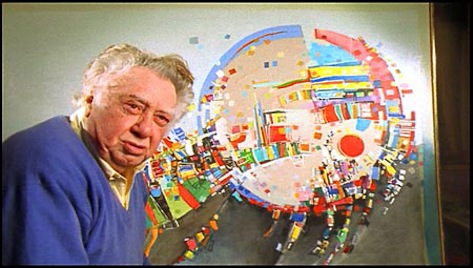KERA's Albert Acalay: Self Portraits paints vividly, movingly
11/24/08 11:31 AM

By ED BARK
Albert Alcalay lived and painted on a relatively small landscape compared to the splashier artists of his day.
He was no Jackson Pollock, Salvador Dali or Andy Warhol, all of whom sought and basked in the attention paid them.
Alcalay, who died in March at the age of 90, made quieter brushstrokes while hoping that his art might at least have a modest impact.
KERA/Channel 13's Albert Alcalay: Self Portraits, in its own way a masterpiece, is a vivid and touching look at this Holocaust survivor who began putting brush to canvas while imprisoned in a Nazi concentration camp.
Premiering at 8 p.m. Monday as part of the station's Art&Seek series of original programming, the one-hour film is the work of former Harvard students Rob Eustis, Allen Moore and KERA veteran Rob Tranchin (Matisse & Picasso). All three took art classes from Alcalay in the late 1970s, and now are paying tribute to him as artists in their own right.
"Painting for me is like an oxygen. Something that's part of me," Alcalay says in the early minutes of the film. We hear these words while he slowly makes his way upstairs to a sunlit studio where he can still light up a sketchbook with his watercolors, even though legally blind.
Self Portraits is without any narrative or interviewer questions. It's more than enough for Alcalay to show and tell us about a life lived in full. Closeups of his many and varied impressionist landscapes often are accompanied by the American jazz music he grew to love after coming to America in 1951 and drinking in the sights/sounds of Times Square.
Alcalay also painted a relative handful of self-portraits, all depicting him as an unsmiling, introspective survivor. The filmmakers frame his crystal-clear reflection in a mirror while he talks about his first self-portrait, which we also see by Alcalay's side. It's a beautifully done segment, a work of art in itself.
Much later in life, Alcalay impulsively sketched a self-portrait in a hospital bathroom just before undergoing successful double bypass surgery. We see this visage, too, and his eyes look even more deep-set.
This is not the story of a brooder, though. Alcalay paints in mostly bright, bold colors while intent on finding new ways to illustrate the emotions that drive his brushstrokes. While in his studio, "I always like the sun to hit me," he says, meaning this literally.
Toward the end of his life, Alcalay revisited the five years he spent both on the run and in captivity. He briefly weeps while talking about his painting of a mountainous region in Italy where he and his family found refuge in a kindly peasant's cottage.
Albert Alcalay: Self Portraits is an exemplary tribute to an artist of many colors and experiences. He painted until the very end, imprecisely dabbing his brushstrokes in a sketch pad while enjoying it none the less.
"Even a deaf composer composes, so why not a blind painter paints?" Alcalay asks with the good nature of a man whose life makes us smile in the end.
GRADE: A
|
